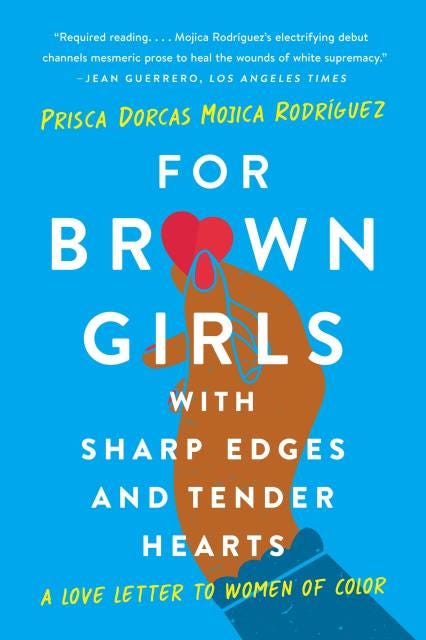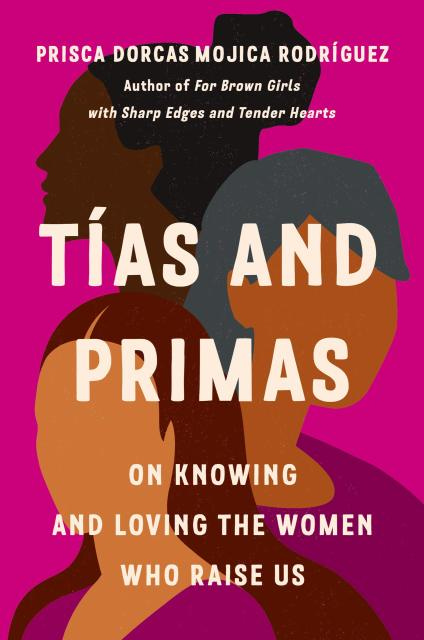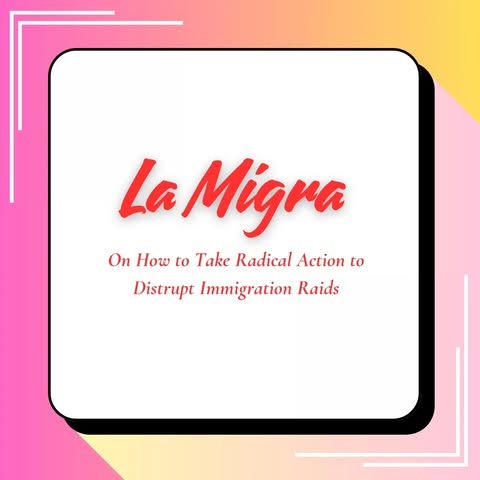"It shouldn't have taken me this long to know about the term ‘toxic masculinity’": Prisca Dorcas Mojica Rodríguez on discoveries in academia, creating Latina Rebels, and her future work
ALSO: if you’re looking for how to respond to assaults on immigrant communities, a beginning list of resources.
Reflecting on her work creating Latina Rebels more than a decade ago, writer Prisca Dorcas Mojica Rodríguez explains that she was “screaming into the void and hoping I'd connect with somebody.”
That screaming has resulted in two books that resonate with readers around the globe and an online presence that unflinchingly focuses on rooting out injustices. From a transformative experience in her graduate divinity program to describing her in-progress novel, Prisca concludes our conversation centering transformation and community uplift.
ANTERO GARCIA: As you were writing Tías and Primas, were you ever worried about the narratives in the book reinforcing any stereotypes? And, somewhat related, do you have a sense of how much the ideas you describe are just of tias and primas of latinidad or how much it goes beyond that?
PRISCA DORCAS MOJICA RODRÍGUEZ: I think it can be really applicable to women in the global south. When you put in the intersection of poverty and lack of education because of corrupt governments because of American interventions, all that stuff, I think that it can create this particular kind of person. I kept putting myself in a lot of the identities in the book. If you read it, I'm like 17 of the 21. I needed people to understand that these are just parts of us. You can be so much more. I say at one point that we contain galaxies within us. It was pulling out one part of this galaxy and explaining it to the full extent that I could and then moving on to the next one and the next one: understanding that you can have all of these parts, and you can also have none of them. That's why I'm very adamant about sharing that this is my context. A few generations in the United States, you might not feel like you have any of these tias. I wouldn't know. I'm an immigrant. I came to the US, and so a lot of the tias and primas that I’m writing about are still in Latin America. So I do a lot of the context sharing to get us out of the idea that I'm defining latinidad. Instead, I'm defining the latinidad that I grew up with.
ALIX DICK: In addition to being a successful author, you are an organizer and many other wonderful things. How did you first start Latina Rebels? Was it 2011?
PDMR: 2013.
AD: I was close! I was trying to remember when I started following it.
PDMR: Yeah. Cinco de Mayo, 2013. I was in my graduate program at the time, and I was just learning so many things that I had never ever heard of before. And also being in a PWI [predominantly white institution], so being surrounded by people having what they would call “philosophical saloons” about the working poor. I remember sitting there with parents who are still working poor. This isn't my philosophical saloon. You're talking about my life. And so it was feeling really alone. So this need to find someone, anyone. Screaming into the void and hoping I'd connect with somebody.
I was also trying to figure out how to make this information accessible. I went to college and I didn't hear about any of this. So I had to go to grad school in Nashville, Tennessee to hear about this. At that time I was like 26, 27. So I had this frustration, like, "This needs to be accessible faster." It needs to be distilled differently in more ways. I needed to find a different strategy.
Academics are swimming in these ideas, but their books get miniscule printings. There are phenomenal ideas but only in academic libraries or, if you’re lucky, they get assigned to you. So it was that. It was like, "How do I make memes? How do I find memes? How do I give anything to make people think about this stuff earlier and letting them then decide what they want to believe." So it was always that it was like, "It shouldn't have taken me this long to know about the term ‘toxic masculinity.’"
AG: La Cuenta refers to the hidden costs of being undocumented in the U.S. So much of your writing and advocacy speaks to the immigrant experience very directly. Based on your work, is there an invisible costs you might name for undocumented communities or individuals?
PDMR: In Tias and Primas I write about how there's this displacement that happens for children of immigrants who are given these scripts around what it means to be in the U.S. On TikTok you can see a lot of dreamers saying, "Well, I didn't ask to be here. I was brought here against my will." But it is like you're regurgitating all this stuff that you've been told that has vilified your parents instead of the American government that has situated us in this position to have to leave our countries. So I think that displacement that happens between generations, those that come here and then those who become enculturated into these harmful narratives. I think that's a huge cost that people don't think about.
“You're regurgitating all this stuff that you've been told that has vilified your parents instead of the American government that has situated us in this position to have to leave our countries.”
AD: Wow. I was wondering if you could speak to if or how your master’s degree in divinity shapes your work.
PDMR: If you'd met me before my master’s of divinity, you wouldn't recognize me. For sure. I think my parents are still struggling with who I've become because of the degree because, in my Christian tradition, women are just less.
I wasn't allowed to have theological reflections. I wasn't allowed to ask questions. I was in seventh grade and I asked mi mami, "If God knows everything that's going to happen, why was Jesus betrayed? Why did God allow that?" It was just really simple, one-on-one free will question. She looked at me and she's like, "Don't say that in front of your dad. You're not supposed to question God." And I was like, "What?"
I got to ask those questions in divinity school. And I wanted to do that. It was a big reason why I applied to the program. I didn't know so many things. I didn't know that there were different theological takes. I had no idea that there was queer theology, feminist theology, Womanist theology, Mujerista theology. I had no idea that we were mostly abiding by a very old school Augustinian theology.
It really radicalized me to have agency over my belief system that I didn't know I could have. And I love my degree because you don't only study the Bible and church history. It felt like it moved my whole ... everything changed. And I have not looked back.
AG: Our last question is just kind of wrap up: you've been on a whirlwind tour with Tias and Primas and hopefully are getting a well-deserved break. Do you have a sense of what's next? As you write right now, are there texts that are inspiring you?
PDMR: It's actually Judy Blume’s Are you there? God, it's me, Margaret. I’m writing a response to that book.
AG: Oh, wow.
PDMR: But [my protagonist] is 13. She's an immigrant. And it starts out, the first scene, in her very Pentecostal church, the Holy Spirit has come down on the church and everybody is speaking in tongues. And her dad makes eye contact with her because she's old enough to now be touched by the spirit. And she's having an internal dialogue being like, "Okay, God, I'm sorry that I had a crush on this guy and I won't like boys anymore." She's begging God in front of her dad to let her speak in tongues, and that doesn't happen. So she just starts repeating the stuff she's hearing around her, just so her dad will leave her alone. The rest of the book is her trying to figure out "What's up, God?" Like, "Are you there? Is this something I believe in?" But it is through a very specific lens that I didn't read from Judy Blume.
So as somebody who read a lot of white 13-year-old little girls as a 13-year-old little girl, I want a book that feels like something I could have picked up and been like, "Yes."
Propina
We want to thank Prisca for her generosity and time. If you missed the first two parts of our conversation, you can find them here:
And be sure to check out Prisca’s books:
Lastly, we are aware that this is a particularly difficult time for our undocumented community. We will have a post focused on various resources you can access (and ways you can reach out if you need materials sent directly to you) next week. In the meantime, here are some things to get us started:
PDF link here.
Red Cards in multiple languages here:
We’ll see you next week.














